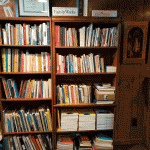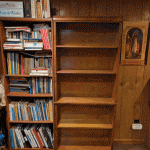 Now that one office file cabinet is pretty much pruned and reorganized, I decided to tackle my two bookcases which hold work related books. I had a happy conundrum. Friends who were moving out of town offered me one of their bookcases. It matched my main bookcase in size and style so I was happy to take it. The problem is that I now had 10 shelves available to fill rather than just 8 (My second bookcase was a shorter one.) This seemed like an invitation to save everything plus possibly add some more books – certainly not the goal of a declutterer. So, how did I justify filling 2 more shelves? First I put the disintegrating old 3 shelf bookcase out for the trash. Then I needed to decide how to use my new space.
Now that one office file cabinet is pretty much pruned and reorganized, I decided to tackle my two bookcases which hold work related books. I had a happy conundrum. Friends who were moving out of town offered me one of their bookcases. It matched my main bookcase in size and style so I was happy to take it. The problem is that I now had 10 shelves available to fill rather than just 8 (My second bookcase was a shorter one.) This seemed like an invitation to save everything plus possibly add some more books – certainly not the goal of a declutterer. So, how did I justify filling 2 more shelves? First I put the disintegrating old 3 shelf bookcase out for the trash. Then I needed to decide how to use my new space.
6 ORGANIZING PRINCIPLES:
- Position the books better. Some of the original books were crammed into fewer shelves by stacking extra books horizontally on top of the vertical books. Now I had space for each book to have its own proper space.
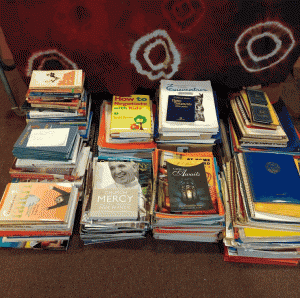
- Re-organize the books. I had five main categories of books – prayer, marriage, parenting, programs, and miscellaneous (peace, justice, simplicity, environment, and supplies like folders, notebooks, etc.) Now I had room to keep the main categories together so I could find stuff more easily.
- Remove duplicates. I found 4 duplicate books that I didn’t know I had. Now I have some to give away.
- Remove obsolete items. I realized that my Singapore son was storing an old boom box on one of the bookcases. I hadn’t pressed him to take it with him because it had this clever function of being able to copy tapes. Aha! I may be a
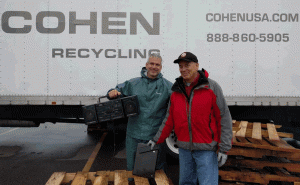 baby boomer but even I realize that few songs are on tape these days and even fewer working boom boxes remain that can play tapes. He confirmed that I could take it to the E-waste recycling drive sponsored by Cohen Recycling. My husband added his failing laptop computer to my tech clean-up.
baby boomer but even I realize that few songs are on tape these days and even fewer working boom boxes remain that can play tapes. He confirmed that I could take it to the E-waste recycling drive sponsored by Cohen Recycling. My husband added his failing laptop computer to my tech clean-up. -
Let go of periodicals. This should have been a no brainer, but only by going through my piles from the emptied bookcase did I realize that I had 87 magazines. Most were dated from 2002-2011. I kept the 7 that contained articles that I had written (a few of them within the past year) and pitched the rest. These were quality magazines and many of the articles were probably worthwhile, but the odds of me finding a relevant article when I needed it were slim. I still get the periodicals but have been regularly recycling them when the next one arrives. Who knows why I kept the older ones? Maybe it was before I realized I’d never go back and read them again.
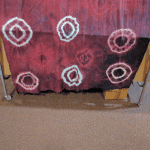 Fill extra shelves with stored books, thus freeing up table space. Tables are meant to sit around or to hold frequently used items. BUT, I had one table that was mostly holding boxes of my books (and file boxes of my husband’s paper work). I’m not in charge of Jim’s supplies, but I felt good about emptying 3 boxes of my “books for sale” into my extra shelf space.
Fill extra shelves with stored books, thus freeing up table space. Tables are meant to sit around or to hold frequently used items. BUT, I had one table that was mostly holding boxes of my books (and file boxes of my husband’s paper work). I’m not in charge of Jim’s supplies, but I felt good about emptying 3 boxes of my “books for sale” into my extra shelf space.
3 LIFE LESSONS
- It’s easier to find things. Periodically going through stuff I’ve had “forever” helped me recognize what’s changed in my profession, what’s no longer necessary, and to find what’s still relevant.
- The internet as storage space. As I let go of paper stuff (books, files, handouts, etc.) I kept asking myself: Is this already on my computer or in the cloud? If so, I don’t need to keep all the paper back-up. This presumes, of course, that I also have a logical, useful way of categorizing information on my computer.
- It’ll be easier on my kids. I’m not planning on dying soon, but one never knows. Having recently gone through my mother’s stuff after her death, I realize that sorting through another person’s memorabilia is a bitter-sweet experience. On one hand, the memories it evokes are precious and priceless. But on the other hand, a lot of the sorting is time-consuming and wasteful. The temptation is to just throw it all away.
I’m still in the active working phase of my life so I still need reference books, outlines of talks, and professional resources. There will be a time for me to prune much more of the traces of my life, but I don’t want to save so much that the important stuff is thrown out with the trivial because it’s just too much to review.
